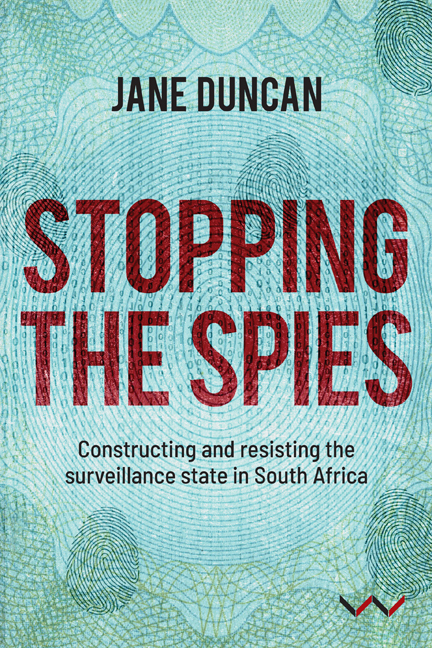Book contents
- Frontmatter
- Contents
- Acknowledgements
- List of Figures and Tables
- List of Acronyms
- Preface
- Introduction
- Chapter 1 Theorising the surveillance state
- Chapter 2 Is privacy dead? Resistance to surveillance after the Snowden disclosures
- Chapter 3 The context of surveillance and social control in South Africa
- Chapter 4 Lawful interception in South Africa
- Chapter 5 State mass surveillance, tactical surveillance and hacking in South Africa
- Chapter 6 Privacy, surveillance and public spaces in South Africa
- Chapter 7 Privacy, surveillance and population management: the turn to biometrics
- Chapter 8 Stopping the spies: resisting unaccountable surveillance in South Africa
- Chapter 9 Conclusion
- Notes
- Select Bibliography
- Index
Chapter 3 - The context of surveillance and social control in South Africa
Published online by Cambridge University Press: 17 May 2019
- Frontmatter
- Contents
- Acknowledgements
- List of Figures and Tables
- List of Acronyms
- Preface
- Introduction
- Chapter 1 Theorising the surveillance state
- Chapter 2 Is privacy dead? Resistance to surveillance after the Snowden disclosures
- Chapter 3 The context of surveillance and social control in South Africa
- Chapter 4 Lawful interception in South Africa
- Chapter 5 State mass surveillance, tactical surveillance and hacking in South Africa
- Chapter 6 Privacy, surveillance and public spaces in South Africa
- Chapter 7 Privacy, surveillance and population management: the turn to biometrics
- Chapter 8 Stopping the spies: resisting unaccountable surveillance in South Africa
- Chapter 9 Conclusion
- Notes
- Select Bibliography
- Index
Summary
Since the Marikana massacre in 2012 – when scores of mine workers were shot by the police after a protracted strike – several journalists, academics and media commentators have argued that South Africa is reverting to a repressive state. They have interpreted violence at the hands of the police generally, and Marikana specifically, as signs that the post-apartheid social order can no longer be held in check through consent alone. They argue that the ruling African National Congress (ANC) and other powerful actors have concluded that naked violence is now needed to stabilise increasingly fractious social relations. Some have even used the term ‘police state’ to describe post-Marikana South Africa.
As a police state is one in which the police act as a political force to contain social dissent using arbitrary force, it is an important manifestation of a more repressive state; another is a society ruled by its military. In the past, the apartheid state used its intelligence services – especially those in the police and military – to identify and target political activists, and this chapter sketches some of this history. How likely is South Africa to descend into a state of full-blown repression, in which intelligence is misused once again to repress dissent violently? How likely is it that there will be more Marikanas? This chapter engages with these broader questions.
THE INTELLIGENCE SERVICES IN APARTHEID SOUTH AFRICA
South Africa's intelligence services date back to its establishment as a Republic in 1961, although the South African police had developed intelligence capabilities before then, under the watchful eye of the UK. The declaration of the armed struggle by the major liberation movements in the wake of the 1960 Sharpeville massacre also added impetus to the apartheid government's decision, as it felt that this new threat could only be countered effectively through intelligence. The South African Defence Force (SADF) established its own intelligence arm, in the form of the Directorate of Military Intelligence (DMI), the year after the declaration of the Republic, but infighting between the police and military agencies led the government to form an entirely separate civilian intelligence agency devoted to national intelligence, Republican Intelligence (RI). This agency was expanded and transformed into the Bureau of State Security (BOSS) in 1969, and its mandate included the collection and analysis of intelligence, although it developed operational elements, too.
- Type
- Chapter
- Information
- Stopping the SpiesConstructing and resisting the surveillance state in South Africa, pp. 57 - 88Publisher: Wits University PressPrint publication year: 2018

